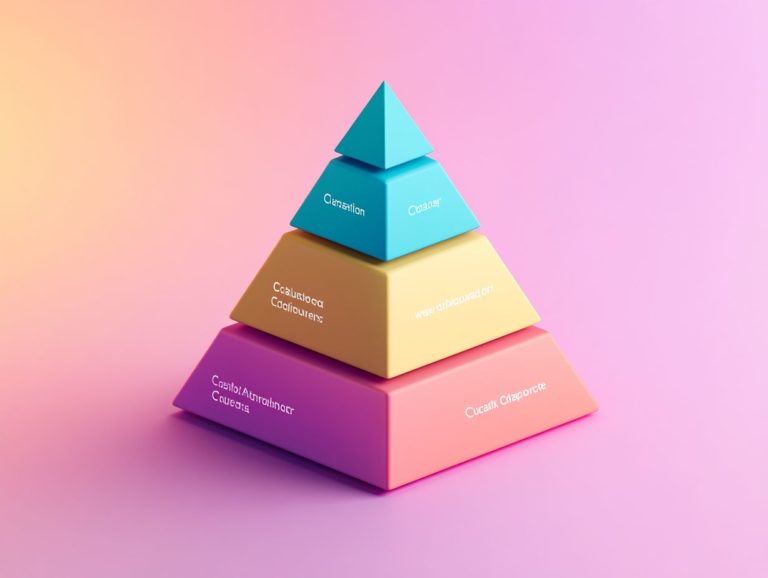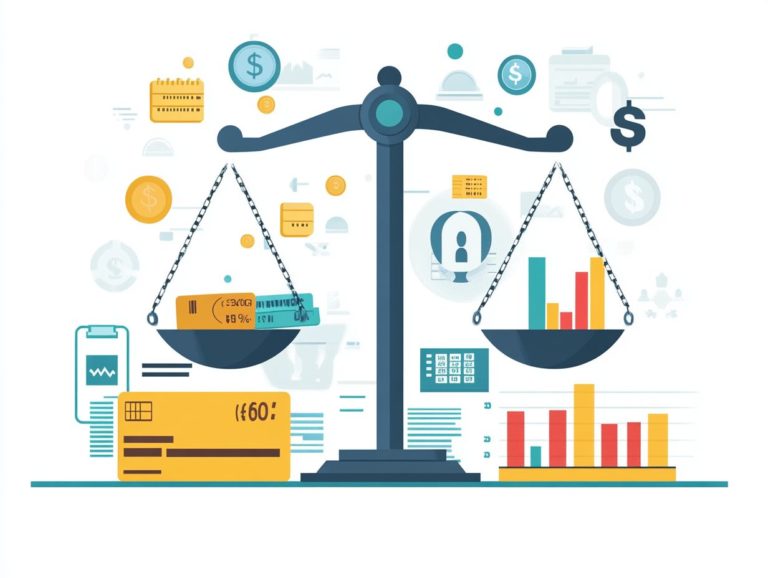How Credit Card Utilization Ratio Affects Your Score
Want to boost your credit score? Understanding your credit card utilization ratio is key! This article delves into the meaning of this ratio, how to calculate it, and its considerable impact on your creditworthiness.
You’ll discover practical tips for managing your utilization effectively. You will also learn about other important factors that influence your credit score, like payment history and credit mix.
Stay informed to empower yourself in making smarter financial decisions!
Contents
- Key Takeaways:
- Understanding Credit Card Utilization Ratio
- Impact of Credit Card Utilization on Credit Score
- Tips for Managing Credit Card Utilization
- Common Misconceptions About Credit Card Utilization
- Other Factors That Affect Credit Score
- Common Questions About Credit Scores
- How does credit card utilization affect my credit score?
- What is considered a good credit card utilization?
- How often is credit card utilization reported to credit bureaus?
- What are some ways to improve my credit card utilization?
- Does a high credit card utilization affect my credit score more than other factors?
- Will closing a credit card account affect my credit card utilization?
Key Takeaways:

- Credit card utilization ratio is the percentage of credit used out of the total available credit limit.
- A high utilization ratio can negatively impact your credit score, while a low one can improve it.
- To keep your utilization ratio low, make timely payments and consider increasing your credit limit to decrease the ratio.
Understanding Credit Card Utilization Ratio
The credit card utilization ratio is an essential metric for assessing how much of your total available credit you are using at any moment. Understanding the impact of credit card utilization on your score is crucial, as it significantly influences your credit score.
To calculate this ratio, simply divide your total outstanding balances across all your credit card accounts by your total credit limits, expressing the result as a percentage. This figure provides valuable insight into your spending habits and illustrates how your financial decisions affect your credit profile.
Understanding this ratio gives you the power to make informed choices for your financial health.
Definition and Calculation
The credit utilization ratio is essentially the percentage of credit you re currently using compared to your total available credit. It plays a pivotal role in determining your creditworthiness.
Grasping how to calculate this ratio is crucial if you aim to maintain or elevate your credit score. To determine your utilization ratio, simply employ this straightforward formula: (Total Outstanding Balances / Total Credit Limits) x 100. If you have multiple credit cards with different credit limits, add up all your outstanding balances and then divide that sum by the total of those limits.
This metric is significant. A lower utilization ratio signifies responsible credit management, which can have a positive impact on your credit scores. It s generally advisable to keep this ratio below 30% because higher percentages might raise red flags for lenders, signaling potential financial distress.
Impact of Credit Card Utilization on Credit Score
Credit card utilization plays a pivotal role in shaping your credit score, a fundamental element that assesses your creditworthiness and borrowing capacity. This metric is integral to both the FICO and VantageScore systems used to calculate credit scores.
If your utilization ratio is high, it may signal a heightened lending risk. This could result in a lower credit score. Conversely, keeping your utilization rate low can enhance your credit profile, paving the way for credit limit increases and improved financial opportunities.
How it Affects Your Credit Score
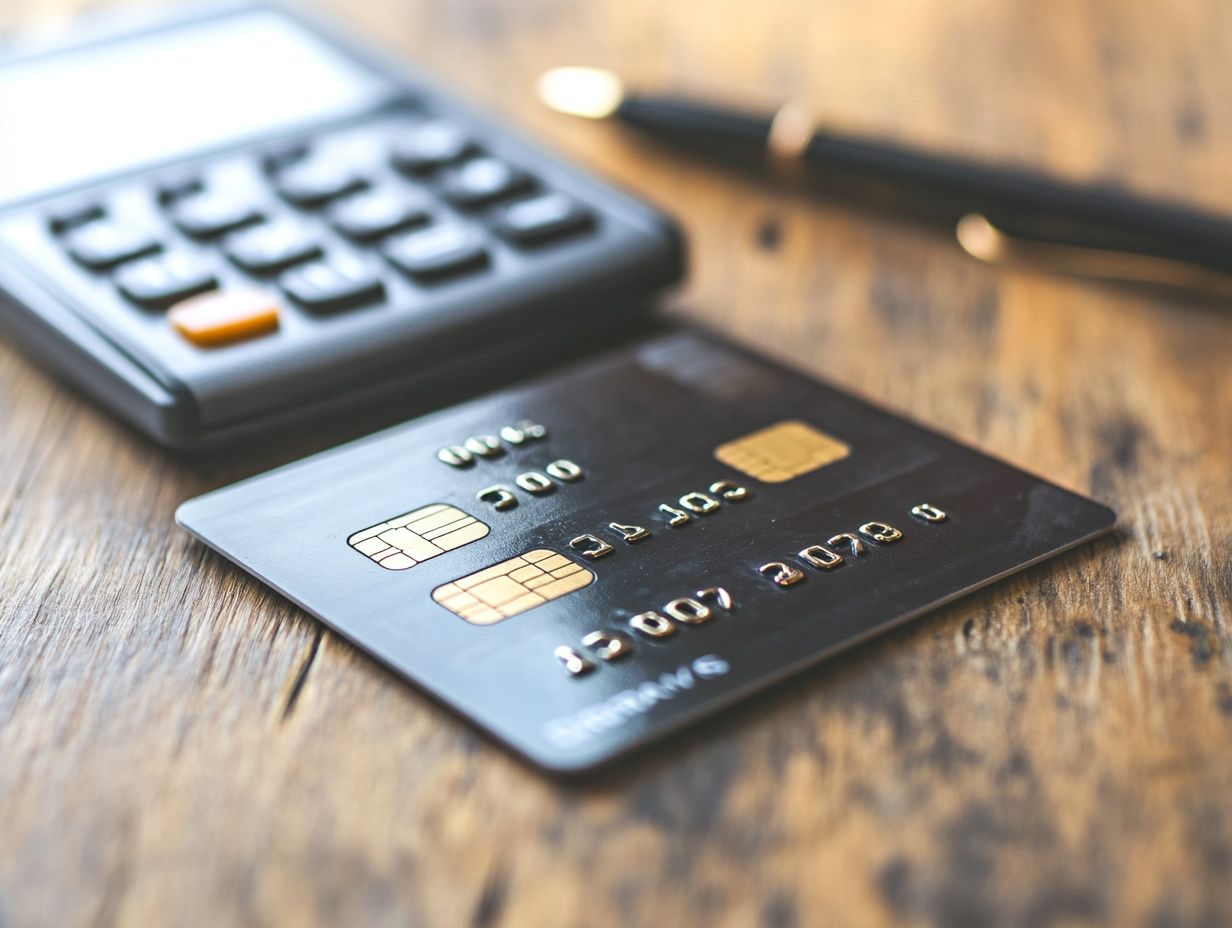
Your credit score can take a hit if your credit utilization ratio is high. This signals to lenders that you might be stretching your finances too thin. This ratio, which compares your total credit card balances to your total credit limits, serves as a crucial indicator of how responsibly you manage your credit.
When you consistently utilize a significant portion of your available credit, it raises a red flag for lenders, suggesting an increased risk of default.
Many credit scoring models suggest keeping your utilization ratio below 30% for a more favorable score. If your credit card limits are low or your overall debt levels are high, it can complicate matters. This makes it difficult to maintain that ideal ratio. Understanding what credit utilization is and keeping a close eye on it is essential for maintaining a healthy credit profile.
Don t wait! Monitor your credit utilization now to enhance your financial future.
Tips for Managing Credit Card Utilization
Effectively managing how much of your credit you’re using is crucial for maintaining a strong credit score. Here are a few strategies to keep this ratio low while making savvy financial decisions.
Consider:
- Requesting a credit limit increase
- Making timely payments
- Utilizing balance transfer credit cards
- Consistently monitoring your credit with an app that helps you track your spending and credit
By implementing these tips, you can keep your credit usage low and improve your overall credit health, opening the door to future financial opportunities.
Strategies for Keeping Utilization Low
Keep your credit usage low with these simple steps. You can achieve this through a series of strategic actions, like increasing your credit limits and maintaining a timely payment history.
Request a credit limit increase to enhance your available credit, which lowers your utilization ratio. It s essential to manage your outstanding balances effectively. Making payments on time helps you maintain a stellar payment history and contributes to a lower utilization rate.
Using a credit monitoring app is vital in this endeavor. It allows you to track your spending habits, identify patterns, and promptly address any potential issues. When you combine these strategies, you create a comprehensive method for maintaining a healthy credit profile, ultimately leading to better financial opportunities.
Common Misconceptions About Credit Card Utilization
You might hear some common myths surrounding credit card utilization that can mislead you. For example, you might think that closing credit card accounts will enhance your utilization ratio.
However, this could actually lower your total credit limit, potentially harming your credit score instead. This shows how important it is to understand the true dynamics of credit management.
Debunking Myths and Clarifying Facts
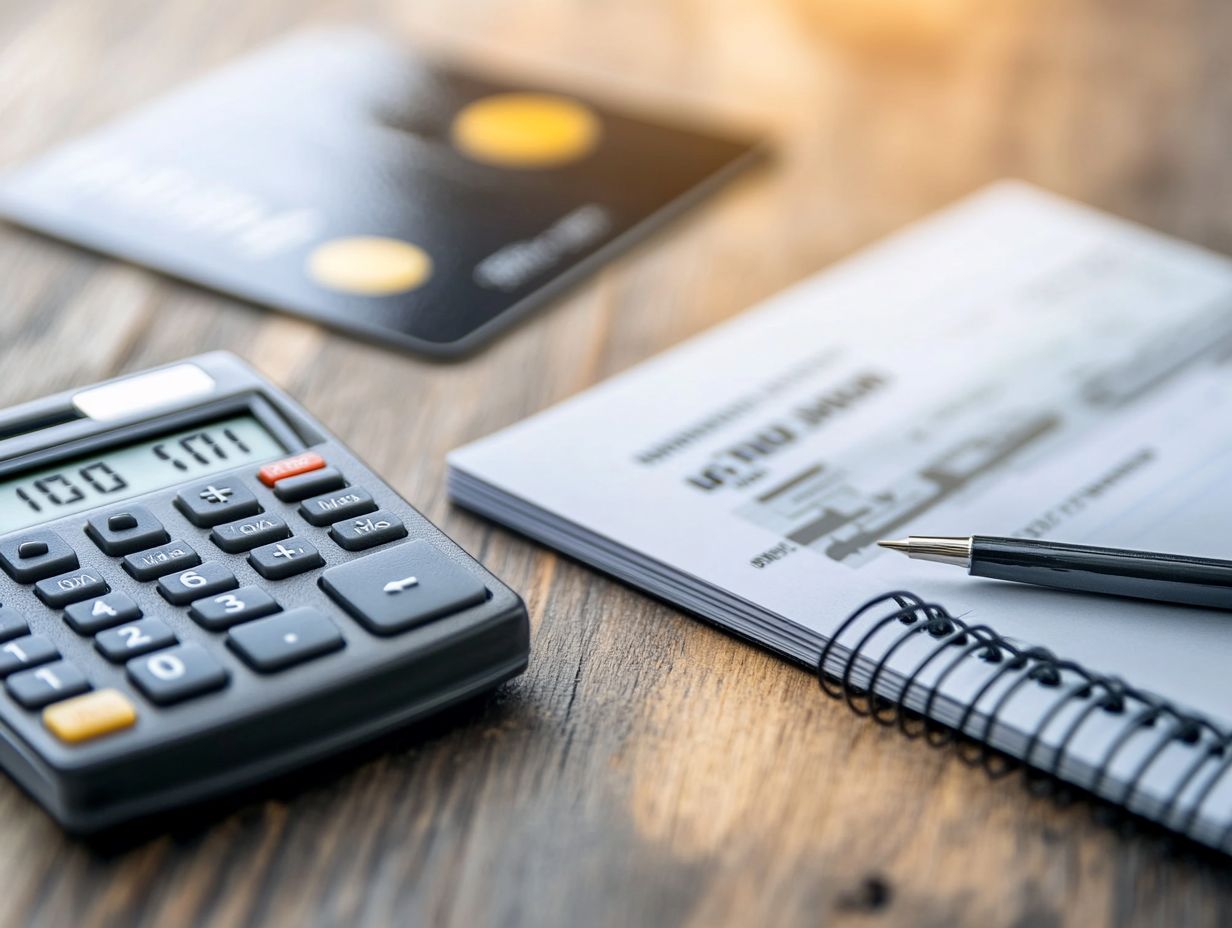
Debunking the myths surrounding credit utilization is key because wrong information can lead to bad financial habits.
You might think that carrying a small balance on your credit cards demonstrates responsible credit use, but the truth is that paying off your balances in full each month is the best practice for maintaining high scores. Similarly, you may believe that closing old credit accounts enhances your creditworthiness. In reality, this action can shorten your credit history, a critical component of credit scoring.
By understanding these details, you empower yourself to make smarter financial decisions, ultimately resulting in a healthier credit profile and better borrowing opportunities.
Other Factors That Affect Credit Score
While credit utilization has a significant impact, know that other things also affect your score. These factors ultimately influence your lending risk and approval for credit products.
Your payment history, for instance, constitutes a significant portion of your score. Elements like your credit mix, the number of recent credit inquiries, and total debt levels further inform how lenders evaluate your creditworthiness.
Understanding these nuances gives you the power to make strategic decisions that enhance your financial profile.
Importance of Payment History and Credit Mix
Payment history is very important. It makes up a large part of your credit score. When you consistently make payments on time, it reflects your reliability and financial responsibility qualities that lenders highly value.
Maintaining a diverse credit mix, which includes a combination of credit cards, auto loans, and mortgages, shows lenders you can handle different types of debt. This broader perspective can enhance your credit profile and strengthen your borrowing power.
To keep your credit score in optimal shape, it is vital to pay bills promptly, avoid maxing out credit limits, and regularly check your credit reports for errors. Stick to these tips to create a strong credit history! This will help you achieve your financial dreams.
Common Questions About Credit Scores
How does credit card utilization affect my credit score?
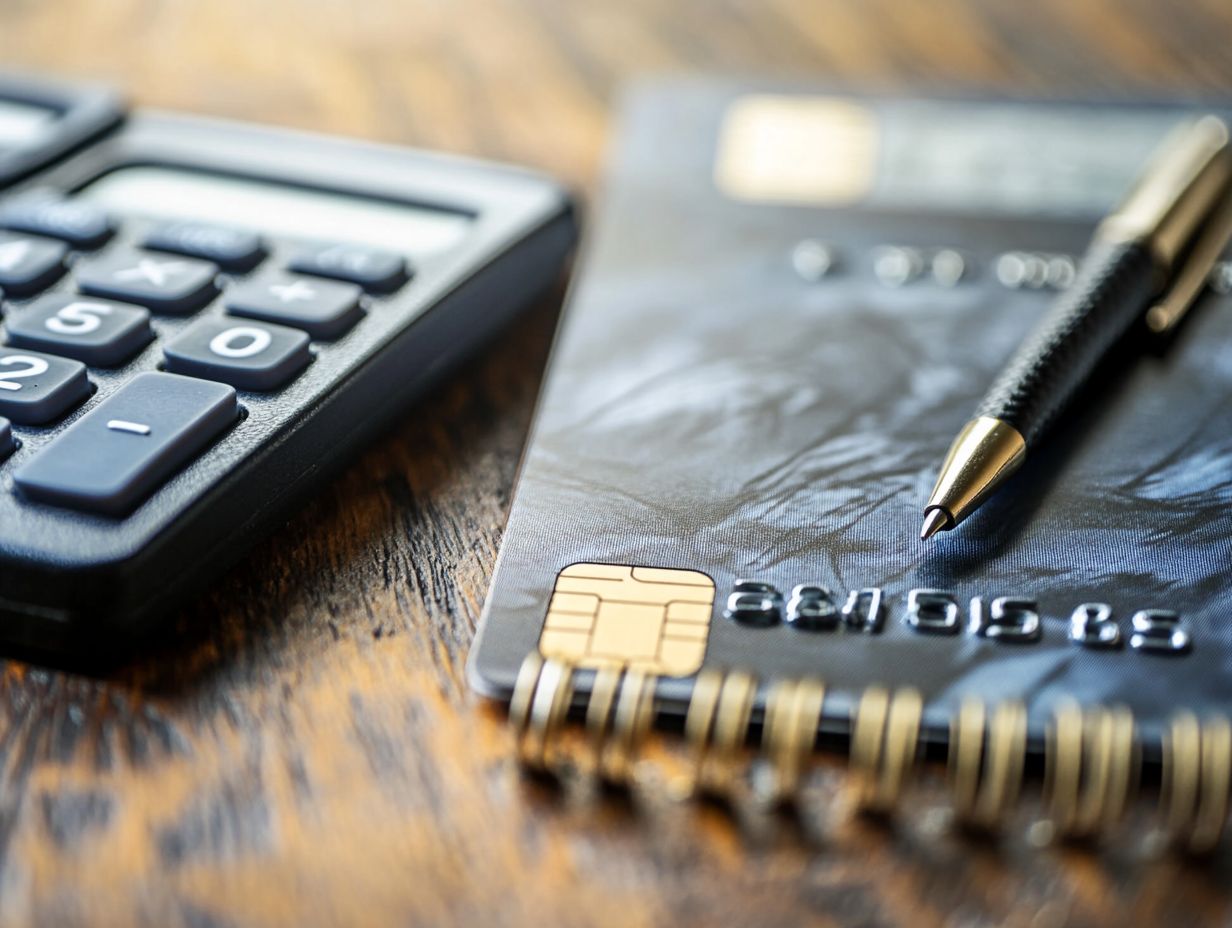
Your credit card utilization is one of the main factors used to calculate your credit score. It represents the percentage of your available credit that you are using. To understand how this affects you, check out the impact of credit cards on your credit score. The higher your utilization, the lower your credit score may be.
What is considered a good credit card utilization?
A lower credit card utilization is generally considered better for your credit score. It is recommended to keep your utilization below 30%. This means using no more than 30% of your available credit at any given time.
How often is credit card utilization reported to credit bureaus?
Credit card utilization is typically reported to credit bureaus once a month, usually around the same time as your billing cycle. This means that it can change month to month, so it’s important to monitor and manage your utilization regularly.
What are some ways to improve my credit card utilization?
To improve your credit card utilization, you can either decrease your credit card balances or increase your credit limits. You can also try to pay off your balances in full each month to keep your utilization low.
Does a high credit card utilization affect my credit score more than other factors?
No, all factors used to calculate your credit score are given equal importance. However, credit card utilization tends to have a more immediate impact on your score as it reflects your current credit usage.
Will closing a credit card account affect my credit card utilization?
Yes, closing a credit card account can potentially lower your available credit, which in turn may increase your utilization. It’s important to consider this before closing a credit card account, especially if it is one of your older accounts.
Start improving your credit score today! Check your credit report now and begin your journey to financial success.


